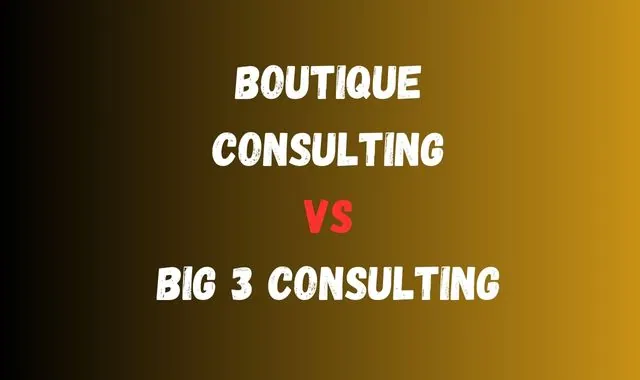Physical Address
304 North Cardinal St.
Dorchester Center, MA 02124
Physical Address
304 North Cardinal St.
Dorchester Center, MA 02124

Boutique consulting vs Big 3 consulting: The world of consulting is a thrilling landscape, brimming with opportunities to solve complex problems and drive real change. But for an aspiring consultant, a crucial first step is choosing the right firm to launch your career. Two prominent paths emerge: the established dominance of the Big 3 consulting firms (McKinsey & Company, Boston Consulting Group, Bain & Company) or the dynamic world of boutique consulting firms. Both offer distinct advantages and considerations, and the ideal choice hinges on your unique career aspirations and personality.
The Big 3 consulting firms are renowned for their prestige and global reach. They tackle a vast array of challenges for Fortune 500 companies, from strategic planning to operational improvement. Working with a Big 3 firm comes with undeniable perks. Imagine collaborating with industry titans, tackling high-profile projects that shape entire industries. These firms invest heavily in training programs, providing you with unparalleled mentorship and a rigorous learning environment. Additionally, the Big 3 brand recognition is a golden stamp on your resume, opening doors to future career opportunities. The chance for international assignments and exposure to diverse cultures further fuels the allure of these giants.
The intense work hours and demanding schedules are legendary. Be prepared for a fast-paced environment with steep competition. While you’ll gain exposure to a wide range of industries, the focus may be less on deep specialization compared to boutiques. The sheer size of these firms can also translate to a less personalized work experience, with less one-on-one guidance.
Boutique consulting firms offer a contrasting experience. Imagine a close-knit team of experts, laser-focused on a specific industry or niche. This fosters an intimate culture where you’ll receive personalized attention and mentorship from seasoned professionals. Boutique firms often boast deeper industry expertise than their Big 3 counterparts. This translates to highly specialized projects where you’ll become a true subject matter expert.
Faster career progression is a hallmark. With a smaller team, you’ll take on greater responsibility sooner, accelerating your learning curve. Boutique firms typically prioritize strong client relationships, allowing you to build close collaborations and witness the real impact of your work. Finally, work-life balance tends to be a stronger focus within boutiques, promoting a sustainable and healthy work style.
While boutique firms offer a compelling alternative, there are certain aspects to consider. The global reach and brand recognition of a Big 3 firm are unmatched. Boutique firms, by their nature, may have a more limited footprint and brand awareness. Training resources might also be less extensive compared to the Big 3’s well-oiled programs. Additionally, starting salaries might be lower at boutiques. Finally, your career success hinges to a larger degree on the overall performance of the smaller firm.
The decision between Big 3 and boutique consulting boils down to introspection. What are your career goals? Are you highly ambitious and thrive in a competitive, fast-paced environment? The Big 3 might be your ideal springboard. Perhaps you’re passionate about a specific industry and crave in-depth expertise? A boutique firm could be the perfect fit.
The Big 3 thrives on individuals who are:
Ideal Candidate for Boutique Consulting
Boutique firms excel with individuals who are:
While the Big 3 and boutiques dominate the conversation, remember, the consulting landscape is vast. Numerous mid-sized and specialized firms offer unique experiences. Don’t limit yourself – explore various options to find the best cultural fit and project opportunities that align with your aspirations.
Understanding your priorities is paramount. Research firms thoroughly and tailor your application to highlight your strengths and fit. Remember, consulting offers a rewarding and diverse career path. Choose wisely, and embark on a journey that will equip you with invaluable skills and propel you towards a fulfilling career.
1. Is an MBA required to work in consulting?
An MBA can be beneficial, but it’s not always mandatory. Many firms value strong analytical skills, problem-solving abilities, and relevant work experience over a specific degree.
2. How much travel is involved in consulting?
Travel can vary depending on the firm, project, and your role. Big 3 firms are known for extensive international travel, while boutiques might involve regional travel or be more focused on local clients.
3. What are the exit opportunities after working in consulting?
Consulting opens doors to various industries. Your skills in problem-solving, communication, and strategy are highly sought after in fields like finance, technology, and general management.
4. How can I prepare for consulting interviews?
Practice case studies, develop strong problem-solving frameworks, and be prepared to discuss your experiences and motivations for pursuing consulting.
5. What are the biggest challenges of a consulting career?
Work-life balance can be demanding, and the travel can be intense. Be prepared to adapt to different work styles and manage your time effectively.